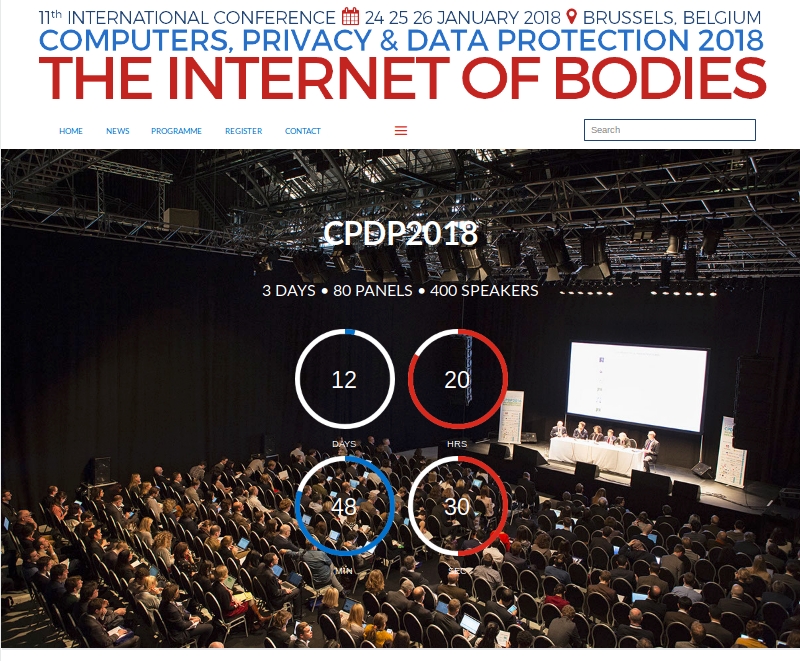praemandatum auf der 11. International Computers, Data Protection and Privacy Konferenz in Brüssel
THE INTERNET OF BODIES
24, 25, 26 January 2018
(English Version below)
Die Computers, Privacy and Data Protection Konferenz bietet ein Forum für kontroverse Debatten zu verschiedensten Aspekten von Datenschutz, Privatsphäre und computerbasierter Technik.
Hier treffen sich in Brüssel alljährlich Verteter*innen aus Zivilgesellschaft, Politik, Wissenschaft und Unternehmen.
praemandatum ist dieses Jahr Event-Partner und organisiert ein Panel
auch aktuelle Ergebnisse der Forschungsprojekte SmartPriv und App-Pets und deren Beitrag für Transparenz und Kontrolle von Algorithmen diskutieren. praemandatum ist an der Forschung in diesen vom Bundesministerium für Bildung und Forschung geförderten Projekten aktiv beteiligt.
English version
„CPDP is a conference about privacy and data protection. It offers a forum where different voices are heard and where positions are compared debated, approached or differentiated. CPDP is a non-profit platform originally founded in 2007 by research groups from the Vrije Universiteit Brussel, the Université de Namur and Tilburg University. The platform was joined in the following years by the Institut National de Recherche en Informatique et en Automatique and the Fraunhofer Institut für System und Innovationsforschung and has now after a decade grown into a platform carried by 20 academic centers of excellence from the EU, the US and beyond. As a world-leading multidisciplinary conference CPDP offers the cutting edge in legal, regulatory, academic and technological development in privacy and data protection. Within an atmosphere of independence and mutual respect, CPDP gathers academics, lawyers, practitioners, policy-makers, industry and civil society from all over the world in Brussels, offering them an arena to exchange ideas and discuss the latest emerging issues and trends. This unique multidisciplinary formula has served to make CPDP one of the leading data protection and privacy conferences in Europe and around the world.“ More
Friday 26 January 2018 at 14:15:
Cybernetics between utopia and loss of control. Managing transparency and accountability of Algorithms through source code?
Organised by Praemandatum Academic: Chair Daniel Guagnin, praemandatum (DE) Moderator Ben Wagner, WU Vienna (AT) Speakers Polina Malaja, FSFE Policy Analyst (DE); Mirco Pietsch, praemandatum (DE); Sandra Wachter, Oxford Internet Institute (UK)
Recently the debate about the power of algorithms has received more and more attention. Their shaping influence on society has become increasingly visible through selecting information in news and social networks. At the same time the dream of controlling society for the good is still hegemonic. The utopia of cybernetics is not new, such is the criticism of the power of those who control the algorithms, which has been put forward by the early Free Software Movement in the Seventies. Beyond the efforts to regulate algorithms, we want to discuss different approaches of how to enable transparency and control of algorithms. For end-users who cannot read source code, Free Software shifts the trust from a commercial company to a community of developers. This opens new levels of transparency and control, but should be complemented by ways to understand the functionality and data flows on a user level. The idea of putting control over algorithms into the hand of the users brings different challenges. The panel brings together different perspectives: companies experimenting with open licenses, privacy scholars and software freedom activists to discuss the potential and the limitations of opening up the source code and other approaches for public scrutiny and control of algorithms. Which accountability does the source code provide? How can we make data flows, underlying norms and inscribed logics of algorithms visible? How can we empower users to take control and achieve transparency beyond the source code?
Program
Daniel Guagnin is a privacy consultant at praemandatum GmbH. He also is a PhD candidate at Technische University and finalizes his thesis on the role of expertise in Free and Open Source Software Communities. Between 2010 and 2014 he worked in a number of research projects on Privacy Awareness, Accountability and Predictive Policing at the Centre of Technology and Society at TU Berlin.
Mirco Pietsch is ‚head of academy‘ at praemandatum. Amongst workshops on security matters adressed at small and medium-sized companies‘ employers, he teaches ‚Applied Data Protection‘ and ‚Digital Education‘ at the Leibniz University of Hanover (ZQS/LUH). His academic interests concern privacy enhancing technologies and privacy usability. He currently contributes to ‚Smart Priv‘, funded by the BMBF (German Federal Ministry of Education and Research). The goal is to improve understanding of data flow while using mobile phones and providing application permissions.

